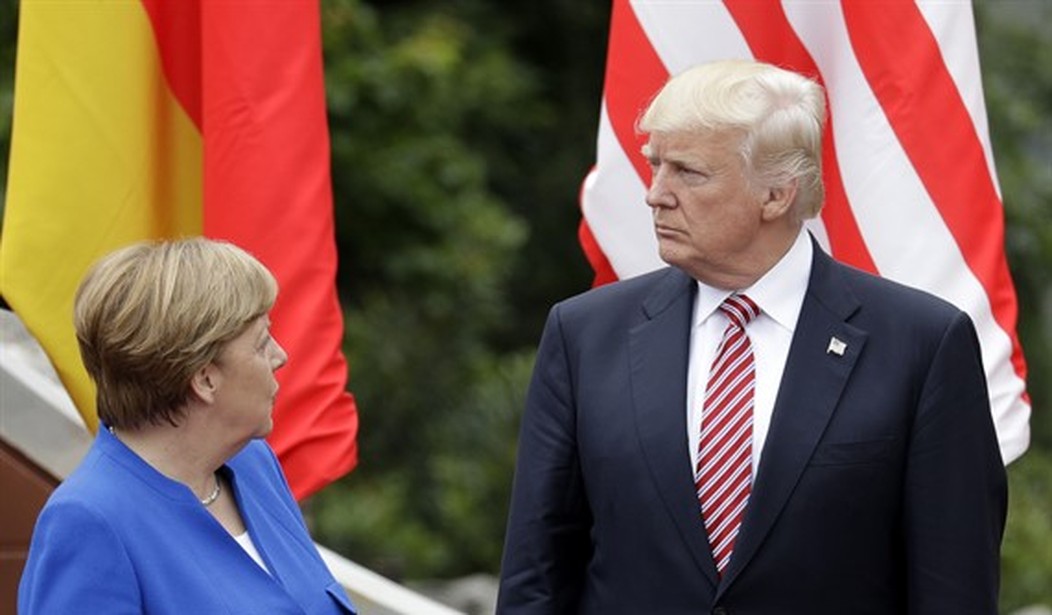Get ready for the meeting that will launch a thousand conspiracy theories. Donald Trump and Vladimir Putin have kept each other at arm’s length ever since the US election, thanks in part to Russian attempts to interfere in the process and Trump’s tough stance on Syria and Bashar al-Assad’s use of chemical weapons. Their first meeting will take place at next week’s G-20 summit, Putin’s spokesman announced today, but it won’t be much more than a handshake:
Russia’s Vladimir Putin and U.S. President Donald Trump will meet on the sidelines of the Group of Twenty summit in Hamburg next week, but no separate meeting is planned, Kremlin spokesman Dmitry Peskov told reporters on Thursday.
That’s a rather shy approach, considering the common assumptions of their affinity for one another. In reality, any substantial contact is more likely to be adversarial. Putin’s not happy with US threats against Assad, even though they appeared to work this week in ending a potential chemical weapons attack out of Shayrat (at least so far). Trump has enough headaches with the Russia probe as it is without inviting more scrutiny into his motives vis-a-vis Putin, and has lots of incentive to prove he can be tough with Russia. For these and other reasons, such as NATO’s nervousness about Trump’s lack of vigor on the Russian threat, it behooves both men to stick to handshakes and pleasantries.
Speaking of headaches, Angela Merkel wants to use the G-20 summit to corner Trump on climate change and the Paris accord:
In forceful remarks before Germany’s Parliament on Thursday, Chancellor Angela Merkel vowed to defend the international climate agreement spurned by the Trump administration, anticipating a difficult meeting of the leaders of the world’s major economies next week in Hamburg.
Despite the withdrawal of the United States, the world’s second-largest polluter, the E.U. remains committed to the Paris climate accord, she said. But she was blunt about the obstacles posed by American retreat from the deal, which was signed by 195 nations in an attempt to forge global consensus around limiting greenhouse gases.
“Since the U.S. announced that it would exit the Paris agreement, we cannot expect any easy talks in Hamburg,” Merkel said, referring to the Group of 20 summit scheduled for July 7-8. “The dissent is obvious, and it would be dishonest to cover it up.”
The dissent was obvious at the G-7 summit, too, and that’s because Trump was the dissent. He didn’t exactly try to “cover it up” or keep it a secret, either. Trump made a very public display of his dissent, and actively promoted it back here in the US. If Merkel continues to make it the center of the US-EU relationship, she’ll find that it plays directly into Trump’s political hand here in the US.
Merkel might do better by working around Trump on climate change — if that’s really her goal. Energy Secretary Rick Perry held a press conference this week in which he discussed the potential human impact on climate change as an issue for consideration. Perry provide Merkel and her EU colleagues a friendly ear and perhaps an informal way to press their case with Trump, rather than a frontal attack which will instinctually move Trump to confrontation rather than cooperation. That won’t suit Merkel politically, however; her constituents want to see Trump confronted and forced into capitulation. This speech to the parliament was for domestic consumption, a “get tough with Trump” pose. Will she stick with that at G-20, or look for more common areas of interest to emphasize after a nominal push on climate change? Trump should be prepared for either.








Join the conversation as a VIP Member